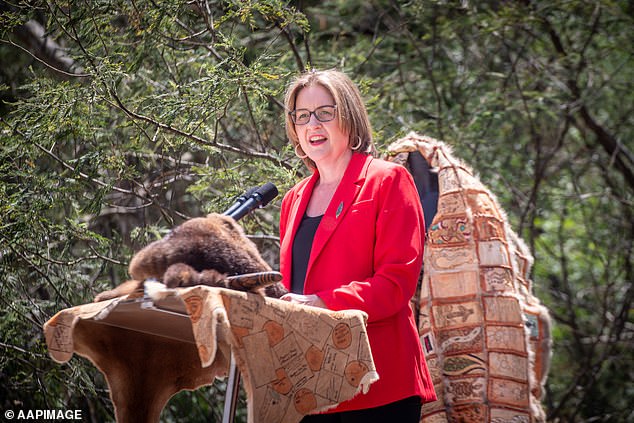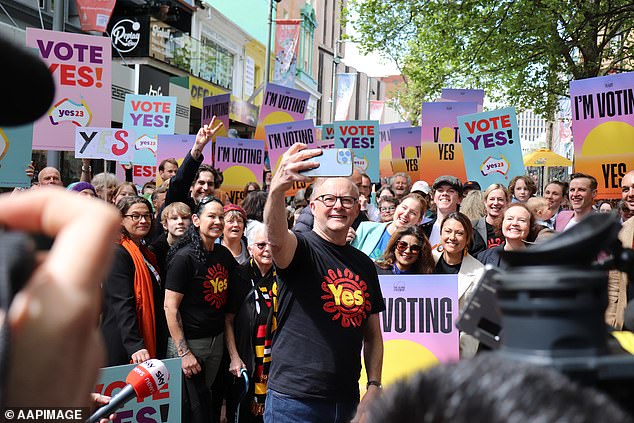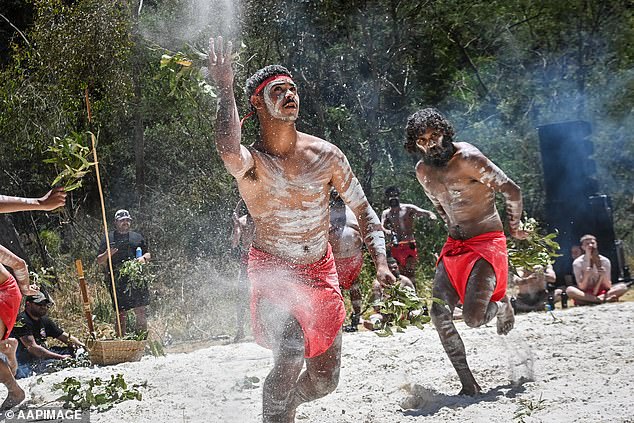The Allan government has been accused of blindsiding Victorians over its plans to allow voters as young as 16 to vote for representatives of a new Indigenous body.
The representative body, known as the Gellung Warl, will advise the government on legislation affecting the state’s Indigenous population.
It makes permanent the First People’s Assembly of Victoria, an elected body established six years ago to consult with the government towards a treaty.
Its design was laid out in a treaty bill introduced to state parliament on Tuesday, the first of its kind in the country.
While the Gellung Warl, a Gunaikurnai phrase meaning ‘tip of the spear’, is the result of almost a decade of preparations, many were taken aback by its specifics.
Like the First People’s Assembly, Indigenous voters as young as 16 will be allowed to participate in the election of its 33 representatives.
‘Jacinta Allan has not been upfront and honest about her radical plan to allow 16-year-olds to vote in Victorian elections for this new third chamber of parliament,’ Margaret Chambers, research fellow at the Institute of Public Affairs told the Daily Mail.
‘Trying to sneak the lowering of the voting age, to 16, into the treaty process, is no doubt an attempt to use it as a Trojan horse for its expansion into other elections, marking an unprecedented change to electoral law in Australia.’

Premier Jacinta Allan (pictured) announced the Victorian government had reached an in-principle agreement with an Indigenous body over the design of Australia’s first treaty
Voting will be open to Victorian Traditional Owners living anywhere in the country or and Indigenous or Torres Strait Islanders who have lived in Victoria for three years.
The Allan government has not explicitly stated why the voting age is two years below the national voting age. Ms Chambers said it was likely to boost voter turn out.
‘The state government is no doubt concerned at the total and utter lack of support the First Peoples’ Assembly was able to generate with such low numbers voting in its two elections in 2019 and 2023,’ she said.
‘That the state government is now desperately seeking to inflate the number of voters for this body tells you all you need to know about true level of support for it in the community.’
‘Worse still, the bill creates a situation where some Victorians, based on their race, will get two votes to determine who governs their state via parliament, while the rest only get one.’
Drafters of the treaty bill took pains to clarify the new body would not affect the Victorian parliament’s ability to make laws and otherwise carry out its business.
Allan refused to put the treaty bill to a vote, either by referendum or at next year’s election, claiming Victorians had already endorsed it at previous elections.
Critics have pointed out the details of the treaty have only come into view this week, suggesting there has been no opportunity for an informed vote at past elections.

Critics have likened the treaty bill to the Albanese government’s Voice to Parliament referendum, which a majority of Victorians voted against
Others have pointed to the majority of Victorians who shot down the Albanese government’s Voice to Parliament in 2023 as proof the desirability of a dedicated consultative body is at best an open question.
In response, Allan has distanced the state treaty from the Voice, claiming any such comparison was tantamount to ‘misinformation’, the Herald Sun reported.
‘It’s not about changing the constitution,’ she said, adding it’s ‘very, very different.’
Premier Jacinta Allan announced the government has reached an in-principle agreement with the First People’s Assembly over the treaty on Tuesday.
It followed ten months of negotiations and is expected to cost just over $300million from 2020 to 2028.
The new advisory body will also be able to propose name changes for specified geographical features, provided they offer evidence of its offensiveness.
Public school students will be taught about Aboriginal experiences since colonisation based on the Yoorrook Justice Commission’s official public record.
The Allan government also agreed to issue a future apology to the state’s first inhabitants in parliament.

The Allan government has agreed to issue a future apology to First Nations people
The treaty bill is expected to sail through the state’s lower house, where Labor holds a commanding majority, but to face intense scrutiny in the Legislative Council.
A preamble to the agreement touts the ‘dawn of a new era’ in the state.
‘The colony of Victoria was established without the consent, negotiation or recognition of the Traditional Owners of these lands and waters,’ it stated.
‘What followed was violence, destruction and dispossession: a rush to take land, lives, and resources, leaving lasting scars on families, communities and Country itself.’
Daily Mail contacted Allan for comment.
